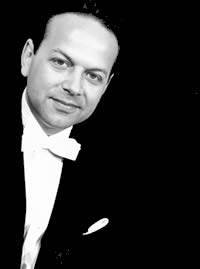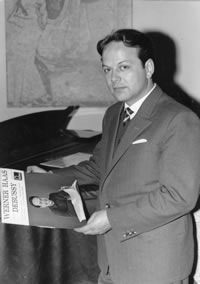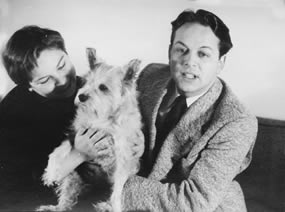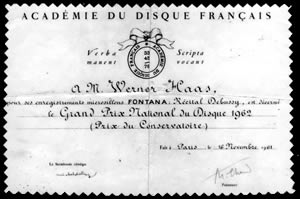
A prospectus of the Dutch concert agency of J.Beek in The Hague announcing >>Four Masters at the Piano<< for the 1967/68 season named Arthur Rubinstein, Nikita Magaloff, Rudolf Firkusny, and the Stuttgart pianist Werner Haas. Already at the age of thirteen Haas attracted attention after winning a competition in Stettin and performing in public. This competition nevertheless turned out to be the only competition of his career as a musician. international competitions of inflationary tendency did not fit his modest and reserved nature. In all peace and quiet a great interpreter matured within him, and he went on to conquer the world without sirrendering to the dubious sweepstakes mentality operating today. Haas´s own words during an interview with Ingo Harden in FonoForum 7/1969 offer us a glimpse at the characteristics defining his personality: >>Already as a small child I began playing the piano - but isn´t that the case with all pianists?<< In his opinion the chance to develop into a >>child prodigy<< would depend on whether one was allowed by one´s parents to present public performances. His own development proceeded >>quite normally<<. As a child he was not trained and trimmed by force to be a pianist and did not really do all that much drilling of pure technique. Then, from 1947 to 1954, he completed >>a quite normal study program<< at the Stuttgart Academy of Music, where Lilli Kröber-Asche was his teacher. Did this pianist, who enlisted herself very much in the cause of the performance of Mozart´s piano music on the old Hammerflügel, steer him toward this historical path? No, not at all. Even at the time of the interview he did not belong to those who as a matter of principle wanted to hear early music on historical instruments or claimed that Bach necessarily must be performed on a harpsichord. In 1954 Haas went to Saarbrücken to receive the famous >>finishing touch<< from Walter Gieseking. Gieseking´s artistic domain was the music of Debussy, and he was also known in France without question as the most important Debussy interpreter. It was thus only natural for the Paris press to refer to this teacher-pupil relationship after Haas´s successful debut, a successful debut precisely with Debussy. >>But the matter is not entirely so simple. I began playing Debussy already at the age of sixteen and ever since then have had a special interest in his music. I also played Debussy for Gieseking during his master classes, for which he always gathered about ten pupils around him, and I may say that he never found fault with anything fundamental about it. But I came to him with pieces that I had worked through to completion!<< The playing style of Werner Haas can in no way be assigned to a single narrow stylistic line. The unobtrusive naturalness of the manual aspect is served up without much ado with excellent virtuosity and a relaxed hand. Haas himself was not all that crazy about being identified with French impressionists. >>I believe<<, so he stated in the abovementioned interview, >>that a lot suits me<<. And these words were certainly not pronounced without due consideration. As he also stated, he long hesitated to included the great Schumann toccata in his toccata recording with fifteen composers from three centuries because before it there had been the recording by Sviatoslav Richter, which was certainly a non plus ultra for his work.
The extensive discography of the master pianist Werner Haas with works by Chopin, Ravel, Debussy, Beethoven, Tchaikovsky, Rachmaninoff, Mendelssohn, Brahms, and Gershwin is something that we owe to the then director of Philips in Paris, Igor B. Maslowski. After a >>Concert des Jeunes<< in Paris in 1958, he heard Haas play piano compositions by Debussy and the next day signed a long-term recording contract with him. Haas received the Grand Prix du Disque after his complete recording of Debussy´s works and the Amsterdam Edison Prize in 1970 for his recording of Ravel´s piano oeuvre.
In Europe´s music capitals Werner Haas was acclaimed for his sensational piano recitals and piano concerto performances with the Stuttgart Chamber Orchestra under Prof. Karl Münchinger, Berlin Philharmonic, Rotterdam Philharmonic under Franz-Paul Decker, Zagreb Philharmonic led by Milan Horvat, Philharmonic Orchestra of the ORTF in Paris, Residence Orchestra of the Hague led by Willem van Otterloo, and Tonhalle Orchestra of Zurich. He made recordings of Rachmaninoff with the Frankfurt Radio Orchestra under Elialu Inbal.
Reviewers placed Werner Haas in the first rank of the great pianists of our time. Erich Herrmann wrote on February 2, 1956, >>Despite his youth, Werner Haas can safely be described as a master pianist. One believes that one has hardly ever heard the much-performed work (Tchaikovsky´s Piano Concerto in B flat minor) performed so overwhelmingly, so enthralingly as it was by this young pianist ... The special thing, the great thing about Werner Hass´s playing was the absolute unity ot the work and its rendering ... He has the tonal delineation, that touch for which the faintest piano is just as reachable as well as the most booming, fullestsounding fortissimo ... An experience that belongs to the most powerful that one can have in a concert!<<

1959 - with his first Debussy Record
The Stuttgarter Nachrichten described Werner Haas´s piano recital of February 7, 1960, with the Chopin études op. 10 as >>a pianistic sensation<<: >>Copperplate virtuosity allows Werner Haas to take the folliwing études to the limits of the possible in matters of tempo. One automatically draws comparisons to the elite of the Chopin keyboard artists, but there is perhaps only one who has at his command the same technical and intellectual sovereignty: Claudio Arrau<<.
High Fidelity had the following to say of Hass´s recording of Chopin´s fourteen waltzes in January 1961: >>In his interpretation of these waltzes one high point follows the next; the most exciting recording of the waltzes since Lipatti<<.
During the previous year, on November 6, 1960, the Harald Tribune of New York wrote of Debussy: >>The playing of Werner Haas manifests the certainty of a great future. Gieseking has a successor. In touch, nuancing, intuition, and elegance of style Haas is already a master<<. In the Saturday Review of New York we read of the same works on October 29, 1960, >>Werner Haas has a kindred, fluent feel for the works chosen, a pronouncedly clear touch, which leads the melody to the high point and lets the tone resound. The piano becomes the singing instrument<<. After a piano evening at Wigmore Hall in London The Times wrote on November 13, 1967, >>How his interpretation stood out from average, what a lively and brilliant style his Debussy and Ravel playing had with all the great imaginative skill of a pianist who seems to have been born for French music<<. On July 3, 1970, one could read in Gente Milan, <<The Académie du Disque, Paris, could not have a moment of doubt about this choice: the glowing fantasy, the masterful command of touch and the wealth of tone colors with which Werner Haas presents these works are truly extraordinary. We call the attention of all music fans to this Debussy album. A Grand Prix which, equipped with the arguments of the highest artistic quality, has a special weight in this year´s worldwide discographic production<<.
The critic Dieter Schorr had the following to say about Werner Haas´s interpretation of Mozart´s Piano Concerto in E flat major KV 449: >>Werner Haas played ... with fitting simplicity clearly pointing to predestined Mozart interpreter. The extremely tasteful, non-ornate, dynamically bridled, and technically dazzlingly polished interpretation exhibted in addition a model correspondence to Münchinger´s strings<<. Finally, Jaqueline Thuilleux wrote in Le Figaro of Paris after a piano recital by Werner Haas in December 1974, >>Among the flood of pianists who daily inundate the concert halls I do not know many who possess the brilliant technique and smilling authority of Werner Haas, who is able to transport the listeners into a refreshing euphoria. In the seventeen Variations sérieuses by Mendelssohn, one is immediately swept away by his relaxation, and the stunning beauty of the sound, and radiance of this music, presented with a simplicity representing the outstanding advantage of this inspired artist. Then Mozart and Beethoven followed. An Appassionata, nore enthralling than unsettling with a balancing act mercilessly inserted into the presto finale and conjuring up Gershwin and the world of jazz. With his transparent clarity precluding even the shadow of a delay Werner Haas is indeed an exciting interpreter of Prokofieff and Ravel. That does not stop him, however, from letting Chopin sing an enchanting lyricism or from lending the Carnaval of Schumann a spellbinding interpretation, even though after my taste with somewhat too free rhythmic fluctuations.<<
Werner Haas´s richly filled life was brought to an abrubt end by a fatal automobile accident near Nancy in eastern France on October 11, 1976, in a head-on collision with a huge truck. The driver of the truck was presumably very tired, and Haas was not at fault. A few days before Haas had played an unforgettable piano recital in Caen near Paris and the Chopin études op. 25 No. 12 in C minor as the last of his many encores. The audience members, who gave him a standing ovation, experienced an overwhelming performance of this étude, about which Haas remarked afterwards, >>This étude must be played in this way and not otherwise!<<
Is it extraordinary that twenty-five years after Haas´s death up to 100,000 LPs, CDs, MCs by him are sold each year all over the world by the successor company of Philips?

Werner Haas with his sister Isolde
In March 1995 the American music critic James Harvey wrote in the recording magazine Classic Tracks of St. Louis: >>Philips has blessed lovers of classical music with this two-in-one sets. Apart from the budget price, the performances are to be regarded as first class and the sound quality is also excellent. I was very especially pleased that some of these sets were by Werner Haas, who died in a tragic automobile accident in 1976.

Haas evidently never performed in the United States, but he won European prizes including the Grand Prix du Disque for his recording of Debussy and the Edison Prize for his Ravel works ... His recording attest to the fact that he was a first-class musician with one of the most outstanding piano techniques of this century. For example, one need only listen to Lísle joyeuse or the études. Haas is a modern Debussy player who with his beautiful, radiant tone clears the fog in pieces such as Reflets dans léau pour le piano and La cathédrale engloutie, and Minstrels and Golliwog´s Cake Walk clearly show that Haas can even make the grand piano laugh. Haas presents the most magnificent interpretation of Jeux déau that I have ever heard ... He is beyond any competition from Pascal Rog, and Jean-Philippe Collard with crystal clarity of his touch and his rhythmic vitality ... I have never heard the songs without word (by Mendelssohn) played with such an unafected simplicity and joy. And the trills in the Venetian Gondola Song are by themselves already something beautiful.<<
.......................................................................Hans Sautter
...........................................Translated by Susan Marie Praeder